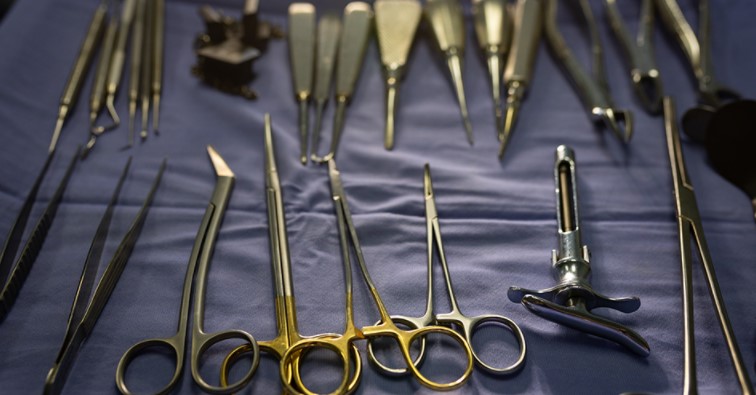Stainless steel has gained popularity in several industries because it is durable yet still lightweight and affordable. It is most commonly used for industrial purposes, but it’s also common in the medical industry and kitchen appliances. So, does surgical steel rust, and can you prevent it?
No, surgical steel does not rust because it is made with stainless steel, which is resistant to rusting. But neglecting the instructions on the tool manufacturer’s manual during the sterilization process can damage the tool or lead to rusting on the tool’s surface.
Another factor contributing to rusting is exposure to corrosive materials such as saltwater. Surgical steel will react with the salt in salt water, but this reaction can be slowed down if the surgical steel is cleaned immediately after contact with saltwater.
As you read further, you will understand what makes surgical steel rust, what can be used to remove the rust, and how to prevent surgical steel from rusting.
Contents
What Causes Rust in Surgical Steel?
Things that can cause surgical stainless steel to rust are as follows:

1. Over-Neutralization Of Alkalinity
The rusting of surgical stainless steel tools can occur when the alkalinity of the steel has been over neutralized, and it normally occurs after the tool has been sterilized.
2. Bloodstains
Bloodstains from surgeries or related medical activities left on surgical tools for a long time can make the instrument start rusting. Typically, floor trays and tools used in extended medical processes like open-heart operations are more prone to pitting and rusting due to their overexposure to blood.
3. Low-Quality Manufacturing Materials:
Ideally, in the production of surgical steel tools, good manufacturers use 300 series stainless steel material for blunt and harder tools, and 400 series stainless steel material for sharp and soft ones.
They do this because they know the reason why the tool is being produced and match the quality of steel to suit that purpose.
But low-quality tool manufacturers do not know these requirements, and therefore, manufacture surgical tools without these distinctions, and use the cheapest available options which eventually cause rust and damage when sterilizing the tool or using it.
- Contaminants like organic matter, halogenic compounds, tissues, etc on the surface of the tool are capable of starting an oxidation reaction.
- Incorrect tool application and sterilization.
- Improper tool storage.
- Leaving detergent leftovers on the surgical steel tool.
- Damage of the tool’s non-reactive layer.
- Poor water quality used in cleaning.
- Particles in reusable linen.
- Keeping used or unused tools wet.
- Cleaning and sterilizing tools that have different metal compositions together.
What Removes Small Rust Stains From Surgical Steel?
Surgistain is a household name in the surgical steel stain remover industry. It is a stainless steel surgical basin, tray, and case cart revitalization solution that is clean, efficient, and quick.
The product gets rid of blood stains and spots, mineral deposits, and scalings caused by hard water which are common problems associated with sterilization.
Also, using vinegar can help scrub the rust off surgical steel.
Note: Before you try removing stains from a surgical tool made of steel, get the tool checked by a qualified repair center first. If the rust on it will not affect the future use of the instrument, then you can use a rust remover to clean it, if not, discard the tool and purchase a new one.
How To Prevent Surgical Steel From Rusting?
Even though surgical tools are made primarily with stainless steel which doesn’t rust, they still show signs of rusting due to their usage on various contaminants. This sign of rusting can be cleaned, but it’s better to be prevented.
Preventing rust in surgical steel tools only requires a little care and maintenance. Here are different methods and techniques you can use to prevent rust in surgical tools:
1. Proper Sterilization
Sterilizing surgical tools the right way helps to keep them in good shape and enhance their usage period. Note that neglecting the sterilization instructions on the manufacturer’s manual can cause the surface of the tool to start rusting or possibly damage.
2. Proper Storage
Proper storage of surgical tools is also a good factor that can help to prevent rusting. Surgical tools should be dried and kept in a dry place after sterilization. Keeping them in an acidic or alkaline environment can lead to the formation of oxide layers on the tool, thereby making it open to rusting.
3. Purchasing Surgical Tools Of High Quality
The material used in the tool’s production is important. Under normal conditions, high-quality stainless steel will not rust because it contains chromium that can form chromium oxide on the surface of the stainless steel tool.
This chromium oxide formed serves as a barrier that prevents corrosion from occurring.
4. Using Rust Inhibitors
Applying rust inhibitors like sodium nitrate or drying the tool thoroughly before storage can help prevent it from rusting.
- Ensure that the alkalinity level of the tool is well neutralized, to avoid discoloration.
Frequently Asked Questions
Is Surgical Steel A Stainless Steel
Surgical steel, also known as surgical stainless steel is a type of stainless steel used in biomedical procedures because of its high degree of corrosion resistance. Surgical steel also tops the list of stainless steel that can withstand the formation of ferrous iron oxides that causes rust in metals.
How Long Can Surgical Steel Last
The majority of surgical instruments can stay in good shape for years if they are properly maintained regularly. Cleaning, disinfecting, and sterilizing instruments are all processes that can be used to maintain surgical steel to prolong its usage period.
What Prevents Rust in Surgical Steel Titanium
Titanium’s greatest advantage is its high level of strength. It has virtually the same tensile properties as carbon steel.
To clean surgical steel, soak the tool in a detergent bath or lukewarm water for a minimum of ten minutes, or until all the stain on the steel is dissolved in water.
Conclusion
Surgical tools do not rust due to the stainless steel material used in its production, and also titanium which has high tensile strength, and therefore, prevents corrosion. Good maintenance and storage can also help to enhance and elongate the tool’s usage period.


